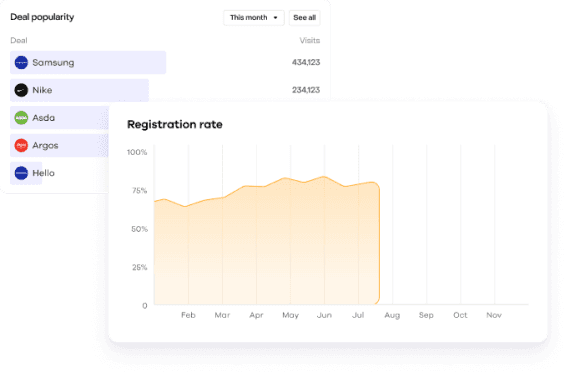Research has found that shift and gig workers experience higher work-related anxiety. In this article, we outline the actions businesses can take to tackle the problem.
Shift and gig work has its benefits - flexibility with working hours, the ability to scale earnings, and autonomy over the jobs you accept - but it has its downside too. To build a loyal and engaged workforce, businesses need to understand the experience of these vital frontline workers and build a system that supports and rewards them.
According to research carried out by the University of Bristol, work-related anxiety is taking its toll on frontline workers’ wellbeing. The researchers surveyed 510 UK frontline economy workers and found that more than three-quarters (76%) experienced work-related insecurity and anxiety.
Not just ‘side hustles’
The anxiety that frontline workers feel is mostly around pay and lack of benefits. More than half reported earning less than the minimum wage, and 65% were anxious about their future pay. Crucially, the researchers looked at the importance of gig and shift work, and they found it should not be dismissed as constituting ‘side hustles’.
Typically, a frontline worker spends 28 hours a week undertaking gigs or shifts, and this work accounts for 60% of their total earnings. For around a third of frontline workers, it’s a full-time pursuit - they work at least 37.5 hours a week on platforms (accounting for 90% of their income).
When you appreciate that gig and shift work isn’t all students looking for extra beer money, and it can be a serious career choice, it's easy to see that frontline workers deserve better conditions. businesses who take steps to tackle work-related anxiety will reap the rewards by building a dedicated workforce and drastically reducing churn.
Improving frontline worker wellbeing
Alleviating anxiety for frontline workers isn’t just about increasing hourly pay. There are other aspects that contribute to a feeling of job security and control over one’s finances. The good news is that it’s easy and not hugely costly to implement them. Let’s look at four benefits you can start offering your workers right now…
Financial protection in the event of not being able to work
No access to sick pay is a major source of anxiety for frontline workers, especially as the work usually requires good mobility and can put workers at higher risk of injury (i.e. bike delivery drivers). In fact, 40% of survey respondents were worried about losing the ability to make a living and becoming unemployed - that’s much higher than the 9% of workers who feel this way in the wider workforce.
Given this concern about fitness for work, it’s no surprise that just under a third of respondents chose sick pay as a benefit with the greatest potential to make a difference to their working life. businesses can effectively provide this by offering accident and sickness insurance. At Onsi, we have plans that provide financial support for workers and their families after illnesses or accidents. Additionally, we can help you support workers with compassionate and family leave, giving them greater peace of mind.
Pay when they need it
While gig and shift working is flexible, the same is not always true about payment terms. Having to wait to be paid is almost certainly a contributory factor to frontline workers’ anxiety, particularly for those who don’t have other income streams. If workers need to borrow money to make it to payday, it creates stress for them and those closest to them.
Onsi offers businesses a simple solution to this in the form of On-Demand Pay. You can pay your workers immediately after every shift so they always have access to money and can deal with whatever life throws at them. On-Demand Pay also benefits the business because it incentivises workers to pick up extra shifts whenever they need an instant cash boost.
Bonuses for going the extra mile
According to the University of Bristol research, nearly 80% of frontline workers agree they have control over the tasks they do and how they do them, which is an encouraging statistic. Despite this autonomy, frontline workers will often go the extra mile to fulfill requests for their businesses. And when this is not recognised it can lead to workers feeling undervalued.
One way for businesses to show their appreciation is by offering instant payments to workers who volunteer for unpopular tasks or one-off shifts. Of course, this benefits you too, by making sure there are always workers happy to take these types of jobs. With Onsi you can also make allowances for things like lunches and fuel, ensuring workers feel properly remunerated.
Extra help with the cost of living
With frontline workers earning an average of £8.97 an hour, whatever businesses can do to supplement that income is going to help improve their working conditions. Onsi has various ways to help workers with the cost of living. One way is to give them discounts on big brands, and you can choose what’s going to be most beneficial to them, like 4% off at Asda or 4p off a litre of fuel at Shell. What’s more, businesses can use these benefits to grow worker loyalty. By creating tiered bands where the benefits increase, you can reward workers for their commitment.
Next steps to take
Businesses mustn't put their heads in the sand when it comes to the spread of work-related anxiety in the industry. Ignoring it will have real business impacts - not only a higher turnover in staff (and all the associated costs) but also a decline in worker wellbeing that leads to worsening customer service.
Ultimately, it pays to grow a happy, engaged, and secure workforce - and you only need to take a few simple steps to do it. If you want to find out more, speak to one of the team today.




